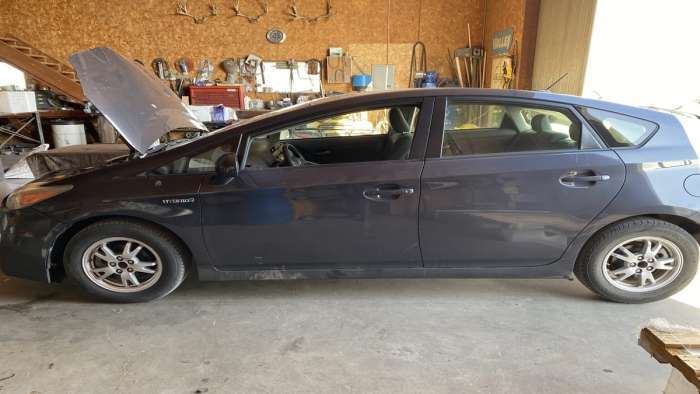If you have not read my other article, Did I make a mistake buying a 2010 Toyota Prius?, make sure you read that. It will help answer some questions you may have.
I have been dealing with hybrids now for quite some time. I have now owned nine hybrids. I have had 6 Prius and 3 Honda Civic Hybrids. Why would anyone own so many hybrids? Great question. I do it to learn so that I can help other people with their hybrids.
I had a lot of experience with Gen 2 Prius, but with Gen 3, I felt like a hypocrite not owning one but giving advice. Granted, I know enough about Gen 3 to guide any owner in the right direction safely, but I needed to have one for myself.
After searching everywhere, I finally came across one locally that needed some engine repair work. Many times the early Gen 3 Prius can be found with a lousy head gasket and picked up for cheap. This Prius was one of those.
After an initial inspection of the car, I found the critical signs to a blown head gasket. Coolant and oil mixed, knocking on startup, and losing coolant in the expansion tank. I knew that this was a common issue and did some research on what the best method of repair would be.
After exploring and researching, I had two options. Replace the head gasket or replace the engine. Here is what I learned from this experience and what I ended up doing.
Your Gen 3 Prius May Need An Engine Replacement
I spent a decent amount of time talking to other hybrid repair technicians. These guys have done many repairs on Gen 3, and all of them told me that just replacing the head gasket is a precarious move.
I have been wrenching for 15 years now and needed a deeper explanation of why this is. What was explained to me is that when the head gasket starts leaking into the cylinder, the liquid coolant has to be expelled somehow. On startup, this coolant cannot be compressed in the engine, and so what happens is this puts extra strain on the connecting rod and usually bends the rod. Thus killing the entire engine.
I was devastated when I found this out, but also it made sense to me. It was at this point I had to decide to either roll the dice and repair the head gasket or replace the entire engine. Replacement of the engine was something I did not want to do. I buy these cars for research, then once they are back to 100%, I sell them and move on. Hence, owning nine hybrids.
Your Prius may not need an engine; it depends on how long the issue has been going on. You will not know that until you pull the head and find out. That was my next step, and what I found out shocked me.
What I Found Upon Pulling The Head On My 2010 Prius
One of my hybrid friends who had been down this road before gave me some excellent guidance once I was able to get the head pulled from the car.

He told me to check the depth of each piston compared to the one next to it. If I have a bent connecting rod, the measurements will not be the same. I dug in, pulling everything apart, and what I found was rather surprising. After pulling the head off and measuring the piston depth, mine were all fine. This comparison should be any owners deciding factor on what to do.
The reason this blew me away is that the Prius had been drinking coolant, the engine oil alone proved that. I decided at this point that if there were something I was missing, I would find out once the engine was back together.
I cleaned up all the parts as best I could, and reassembled the car.
The Aftermath Of Repairing the Prius Head Gasket
I was very nervous about turning the car on after the repair. Even though the block and the head are straight, the valves were seating, and I had gone exactly by the book, I still quivered.
The Prius rattled to life as oil pressure built up within the first few seconds of run time, and then it smoothed out and was quiet. I was very apprehensive about driving it, but I knew I needed to make sure the repair was trustworthy.

I gave the Prius a quick 5-mile test run down the local fuel station and picked up a soda for myself. Quiet, smooth, everything in order. Everything seemed okay until on the return trip. Check engine light. Lucky for me, I always carry my code reader with me on test drives.
I plugged in and saw a P0401, EGR Insufficient Flow Detected. Having this code is crazy because I cleaned every port and passage on the cooler and piping, so there should be no issue at all.
Other than that, I have had no problems at all with the Prius from the engine. It is running well, smooth, and quiet.
Conclusion
I think I got fortunate with this job. As stated before, I spoke with many different technicians about this repair before I ever attempted it. I knew the risks of only doing a head gasket. I knew to check for a bent connecting rod; I knew to flush the engine, clean the EGR system, and all the small things in between. I have been working on cars for 15 years now, so my experience doing this was straight forward.
I think that someone who can follow the OE procedures to do this repair can do it. I also believe that you are taking a considerable risk, only replacing the head gasket. My 2010 has 211,000 well-abused miles on it. I could instantly tell that the previous owners did not care about the car. The green coolant that had been run through the car was a big sign of that.
If you want to fix your 3rd Gen Prius head gasket, know the risk you are taking. Many other problems can show up afterward once the repair has been done. Other problems may not happen until thousands of miles down the road.
So, I think the question now is, Did I make a mistake buying a 2010 Toyota Prius? Time and miles will tell all, but for $500 and some of my time, I think for me, it was worth it. I learned a lot, even more than what I have shared with you here today.
If you have questions or want to discuss doing a head gasket repair on your 3rd Gen Toyota Prius, let me know I am happy to chat with you about it. Hit me up on Twitter or find me on Facebook. I am glad to share my knowledge on hybrids and save you money. See you in the next story. How Long Do Toyota Prius Engines Last?
Watch this Toyota Prius truck with a nice little bed and click to subscribe to Torque News Youtube for daily automotive news analysis.
Peter Neilson is an automotive consultant specializing in electric cars and hybrid battery technologies. He holds a Bachelor of Science in Automotive Service Technology from Weber State University. Peter is also an Instructor of Automotive Technology at Columbia Basin College. Peter can be reached on Linkedin and you can tweet him at The_hybrid_guy on Twitter. Find his page on Facebook at Certified Auto Consulting. Read more of Peter's stories at Toyota news coverage on Torque News. Search Toyota Prius Torque News for more in depth Prius coverage from our reporters.
Set as google preferred source












Comments
In my opinion, you're better
Permalink
In reply to Don - thanks for all the info by Jesse (not verified)
In my opinion, you're better with coolant in the oil than in the exhaust. However, running the motor with coolant in the oil is bad for 2 reasons. First, the coolant reduces the lubrication properties of the oil and second, the level of fluid in the oil pan will soon rise and create a foam when the crankshaft hits the fluid. This also compromises lubrication throughout the motor. The good news is it's less likely that you have damaged a rod at this point, although you still could with continued operation. Have you done a compression test? You can borrow a gauge at an autoparts store of pick one up for 20 bucks or so or you can get a leak down test kit as well. These can both tell you about which cylinder is leaking and perhaps can give you an idea of ring/cylinder wall condition as well. I doubt you will learn anything about piston height through the spark plug hole. If a compression test shows all cylinders between say 130 and 190 PSI and within 10 percent of the cylinder average, then you likely have a good lower end but either a bad cylinder head or more likely a bad cylinder head gasket. If cylinder 2 has much better compression than the other three, you definitely have a bad connecting rod in that cylinder. To do the compression test, you will need to turn the crankshaft in engine diagnostic mode or with a large 1/2 inch electric drill. I've tested motors out of the car like that but don't know whether you can do that on the Prius with the motor in place.
I would get a head gasket kit
Permalink
I would get a head gasket kit from the dealer. Pay close attention to the hydrolock comments before and after your post. It is a very real occurrence with this engine, which is why many dealers and quality shops replace the engine. Too often diy or less experienced shops will spend a lot of time and money on a head gasket (a big job) only to have the engine fail quickly after it is put in service. HG parts and fluids ~$500.
Around here, junkyard motors
Permalink
Around here, junkyard motors (Upull) are around 150. I can pull one in about an hour or so and I've also paid parts pullers in a yard 100 or so to pull one for me. If you get the VIN on a car in the yard, you might even get a dealership to tell you when the last motor was put in, assuming it was done at a dealer. I look for cars with substantial collision damage, then pull the oil filler cap and dipstick to check for coolant mix symptoms. Your parts and fluids are probably only around 100 there. Also, most yards will give you a guarantee...at least a credit you can use there and you can check engine condition before installation. I like using a cheap scope cam thru the spark plug holes that you can pickup at harbor freight or online. Ideally, you'll see the cross hatching from the manufacturing process and not any shiny spots. General shininess means cylinder wall wear and localized shininess means bent connecting rods. On balance, I'd say engine removal is a bit more work but there are less things to do wrong than cylinder head replacement and the lower end of the motor is more likely good for longer. The engine I replaced a cylinder head gasket on went 3K miles before the number one connecting rod went through the engine block. I've also did a motor replacement on a Gen 2 Prius that I still own, and I've put probably 8K miles on it following that. When I got it, the number 4 connecting rod had gone through the engine block. I will also warn you that your hybrid battery may be toast after this whole process is over, depending on how long it takes you to do this. Depending on its condition, at some point, it will lose it's charge and may not be recoverable. You can get a grid charger online for several hundred or if you want to do some more research, you can get a small RC charger that will help keep the battery in good shape.
I'd also strongly recommend
Permalink
I'd also strongly recommend priuschat.com. My comments there are under the screen name donzoh1 but there are a number of people there much more knowledgeable than me about the prius. The above comments here on torquenews are also very insightful.
On your suggestion of
Permalink
On your suggestion of measuring piston height, you probably can do that thru the spark plug hole but you may need to measure from within the tube rather than at the end of the tube above the hole. Use a hard wood dowel that just fits into the spark plug hole or brass tube, etc. cut the ends square and measure to the top of the tube or place a larger diameter tube around the small one that will seat on the cylinder head itself. You'll need to rock the crankshaft a bit to be sure you're at TDC and you'll probably be looking for maybe a few thousandths or so in variation depending on how much deflection there might be in the connecting rod. Also, some of the inspection cameras have a small mirror that allows you to look at a ninety degree angle and that's what you need to see the cylinder wall.
I don't recall if anyone
Permalink
I don't recall if anyone exactly pinpointed the reason these engines blow head gaskets but when I briefly searched in the past some pointed out that the condensation built up in an intake manifold when engine is cold over the time would damage the head gasket.
Ron - that's a different
Permalink
In reply to I don't recall if anyone by Ron Salazar (not verified)
Ron - that's a different issue (I'm 95% sure) - you are talking about when an engine shudders/knocks on first startup in the morning (which is the same symptom as a head gasket failure where coolant seeps into a cylinder overnite), right? And yes, that shudder is because condensed water from the intake manifold is ingested. Toyota came out with a redesigned intake manifold to try to correct that problem. Anyway that has nothing to do with a head gasket failure. Generally speaking, the head gasket failures is caused by the EGR system becoming clogged...because Toyota placed the dirty air return line (can't think of the name of it!) too low on the engine block meaning a more than normal amount of sludge got into that line, which then clogs the EGR cooler, which then makes the engine run hotter, which then takes out the head gasket. Something like that.
Some say that when a car
Permalink
In reply to I don't recall if anyone by Ron Salazar (not verified)
Some say that when a car stops and starts it compresses the gasket. After numerous stops and starts the gasket stays compressed and leaks. Because the Prius motor shuts off at stop lights and when all electric, the gasket wears out.
This might be true if most of
Permalink
In reply to Some say that when a car by Mark (not verified)
This might be true if most of the cars had failures around the same mileage. But, it seems to vary widely, with some examples going to 300K without a failure. The Prius is unique in that the Hybrid Battery/Inverter provides the engine turnover rather than a conventional starter and the hybrid system can generate much more starting torque. But, that's not really an issue here.
With improper maintenance, you can have clogged EGR components (and there are several), oil burning, uneven engine block heating/cooling, etc. If your car burns oil, that usually indicates poor maintenance and can cause a bunch of secondary problems. If it's not been done and you have more than 75K or so, you definitely need to check the intake manifold for oil deposits, thoroughly clean the EGR system components, and then make sure the coolant and oil are in good shape.
Generally, the motor is very dependable and is the same 1.8l 4 cyl used on a bunch of other Toyotas. The car has additional systems not found on conventional cars but I'm not aware of any of these differences that cause head gasket issues. Good, consistent maintenance will pay off in most cars and the Prius is no exception. Its predicted reliability is superior to most.
Does anyone know if the head
Permalink
Does anyone know if the head bolts are the stretched type?
Do I need to replace the head
Permalink
Do I need to replace the head bolts?
How much time did this take
Permalink
How much time did this take you? I just recently cleaned my MAF, throttlebody, intake manifold, replaced my PCV, and cleaned out my entire EGR system, replaced my Waterpump and Thermostat, OH new spark plugs too, that took me about 8 hours start to drive, mostly cleaning though. man that EGR was a pain, I finally took to to the pressure wash, that cleared it out FAST.
But if I were to do the head gasket, how much time should I plan for? Ive watched some videos, and feel confident about it, but I cannot figure out how much time I think it will take. the timing cover looks like the biggest headache.
I also recently did all those
Permalink
In reply to How much time did this take by MARCEL R LA BRECQUE (not verified)
I also recently did all those things on my 2010 too. I did it bit by bit over several days to avoid frustration. I posted photos of what I did on Prius Chat forum. The EGR cooler was the biggest time suck, it was totally clogged, i mean completely.
I don't think it had ever been cleaned before.
All seemed well for a few weeks but the issue is happening again and I'm seeing the coolant level dropping and the shuddering is happening so I'm not optimistic. My car has 268k so I dunno, I might just sell it on for cheap as a project for someone who has the patience and knowledge to repair it.(I don't!)
Shame though because the interior is immaculate. People I have in there can't believe it is a 2010.
Don't touch the head gasket
Permalink
In reply to How much time did this take by MARCEL R LA BRECQUE (not verified)
Don't touch the head gasket unless it's currently causing an issue. Normally, you'll have plenty of white smoke or lost coolant to tell you the problem exists before the car dies completely. If the gasket fails, either replace it ASAP or get a replacement motor from a self service junkyard...see Row52.com for inventory near you.
I'd say 8 to 16 hours for a head gasket although I don't know what the manufacturer book time is. A motor swap is probably about the same. I know I can get a complete Prius power train out in the junkyard in less than an hour. Install time would probably take me what a head gasket would take. I've even called a dealership right from the junkyard with a VIN and they told me when and at what mileage the current motor was put in, although there's no guarantee of this. If you already have a failed head gasket, beware that connecting rods in the motor can be damaged if coolant is entering the cylinder/s after shutdown. Then, you'll get several thousand miles out of the motor before it leaves you on the side of the road.
No coolant loss, clean oil.
Permalink
In reply to Don't touch the head gasket by don hiebert (not verified)
No coolant loss, clean oil. Just averaging 31 MPG. No codes. Cleaned the shit out of everything. The only thing not done is a head gasket because I dont see that as an issue.
Im so freakin stumped.
Coolant could be going almost
Permalink
Coolant could be going almost anywhere after you have had that ll apart. White smoke, either continuous or at startup would suggest gasket issue. Or maybe a cylinder head crack. You might just get a motor at pick n pull from a smashed prius for a couple hundred. It you replaced the head gasket, motor transplant isn't much worse.
No coolant level drops, clean
Permalink
No coolant level drops, clean oil. Runs good. But feels a little under powered. Averaging 31 mpg. Pissed im not in the 40s.
Gonna pull the EGR apart again, make sure its not gummed back up. Im super stumped.
You're correct that head
Permalink
In reply to No coolant level drops, clean by MARCEL (not verified)
You're correct that head gasket is unlikely. Are you sure your fuel is good? Tire pressures? I'm guessing also maybe HV battery and that could be checked with Dr. Prius app. Also, if you could check highway mileage against city mileage, that might tell us something. Unfortunately, I'm not that much of a Prius expert. You should really be looking on Priuschat dot com. If nobody there has the answer, you're screwed.
Yeah good gas, on my 4th tank
Permalink
Yeah good gas, on my 4th tank since all that servicing. Traction battery is at 55.33% health fair condition. No system codes at all. 12v battery is good.
2010 150k miles. New plugs. Just cleaned throttlebody and MAF. Cleaned intake and EGR systems, replaced water pump and thermostat. New coolant and inverter coolant, serviced transmission. New brakes and rotors, no draging, tires are at 42/40 about a year old. Allignment is good. I added an oil catch can when I replaced my PCV to help stop oil blow by into the intake. I was losing a quart per oil change before replacing the PCV, been solid since then and all the clean up/maintenance.
Im really debating replacing my fuel injectors OR getting a BG 44k MOA EPR kit to try out. I know that stuff is mostly snake oil Im just stumped and grasping at straws. I just dumped a bottle or techron fuel injector cleaner in with half a tank to go. Gonna burn that and see of it helps.
I don't think the HV battery
Permalink
I don't think the HV battery would cause that much mileage problem but dunno for sure. I'd be thinking of doing a Seafoam intake/valve cleaning treatment. Easy to do and would help if you have valves sticking. If the timing chain has been off, maybe teeth are not back in the right links? I'm just grasping at straws here too which is why I'm suggesting Priuschat has the solution you're looking for. I think a number of those guys are actually Toyota mechanics but whatever they are, they have extreme knowledge about the Prius and it's the only place I look for advice on them.
my comments at priuschat are
Permalink
my comments at priuschat are under the username donzoh1. i think if you just search your symptoms there, you might come up with the answer. also, the compression test i think would be a good idea. easy to do with cheap equipment you can find almost anywhere.
compression test is best done
Permalink
compression test is best done with the ICE warm but can also be done cold. look for numbers between 140 and 170 PSI with all cylinders within 10 percent of the average value. if you have a cylinder much higher or much lower than the average, you could have sticking valves or piston ring issues. after you get the initial numbers, then repeat the test with a tablespoon or so of oil added to each cylinder. if your numbers go up alot, you have either worn/broken rings or worn cylinder walls. if you have a side looking boroscope you can check to see if there is cylinder wall scoring or wear.
Hi, did you used the
Permalink
Hi, did you used the headgasket kit from Toyota or aftermarket? Can you list all parts you used. Thanks in advanced.
Hi, did you used the
Permalink
Hi, did you used the headgasket kit from Toyota or aftermarket? Can you list all parts you used. Thanks in advanced.
Can't say for sure but likely
Permalink
In reply to Hi, did you used the by Noey (not verified)
Can't say for sure but likely Felpro for bolts and gaskets. I've found their customer service and tech advice superior. Also, I would suggest the water pump. Check the Toyota prices but I generally don't think OEM is worth the extra money. More important than any of that is making sure there's no dissimilar metal polishing in cylinders, chasing all the head bolts threads, and using the correct torque procedure. Make sure you have good, flat surfaces on head and block and that head/valves are not leaking.
I’m doing head gasket on a
Permalink
I’m doing head gasket on a 2014 Prius and took timing cover off with out removing tensioner and timing is off now. I’m getting ready to reassembly and want to verify proper way.
Is the timing off because a
Permalink
Is the timing off because a tooth was jumped or because the tensioner is off/loose? I'd avoid engine rotation until that is sorted out. Priuschat dot com will have the answers here. The tensioner must be installed retracted I believe and then after the chain is on correctly, a screwdriver must've used from the top to release it.
Question: Is the same true
Permalink
Question: Is the same true for other vehicles?? I have had two vans with blown gaskets and both had a transmission issue (and/or engine issue) soon after replacing the head gasket. It's maddening.
I don't see where a
Permalink
I don't see where a transmission issue would be associated with a head gasket replacement, although it's always possible something else will be damaged during a major repair. However, when a head gasket is replaced, there are a whole bunch of mistakes that can be made. I'll just list a few here but there are many more.
1. Head bolts not tightened sufficiently or correctly.
2. Head bolts tightened too much.
3. Damage to cylinder head or engine block not detected.
4. Vacuum lines, fuel lines, coolant lines, sensors, electrical not correctly connected.
5. Timing chain not correctly installed. (This can cause instant comprehensive engine damage.
6. Bent connecting rod (due to continued engine operation after gasket failure) not detected.
I was told by a local
Permalink
I was told by a local mechanic that the failed head gasket on my 2013 Prius v would be best remedied by a new motor. Since my son wants to go to MIT and be an engineer, I thought that, since the motor had a death sentence anyway, we might as well try the gasket replacement job. Worst case, we’d be towing the car to the mechanic instead of driving it. We’ve taken our time, handled resurfacing and torquing of new head bolts, etc, and all has gone reasonably well. But we got stuck in a spot I didn’t think would be difficult: placing the cam shaft assembly on the head block and having it seat properly on the new RTV seal. I’ve managed to get it on the rear guide pins (not easy without messing up the RTV) and fit snugly on the back, but smallest gap I can manage on the front is about 1/16”. I tried “settling” it with a rubber mallet, but it won’t budge. We installed all the bolts, and I assuming torquing them down would take away the gap, but I don’t want to bend or flatten anything if something’s out of alignment (the first attempt, I noticed one of the valve lifters had mis-aligned and was trapped under the frame of the assy.) Is there a trick I’m missing that makes this easy? We’re doing this with the block still in the car, so obviously the angles are more difficult. About to go buy more RTV for our third attempt where we’ll prob try some carpentry clamps, if I can figure a way to get them to grab to press it into place...
Pagination